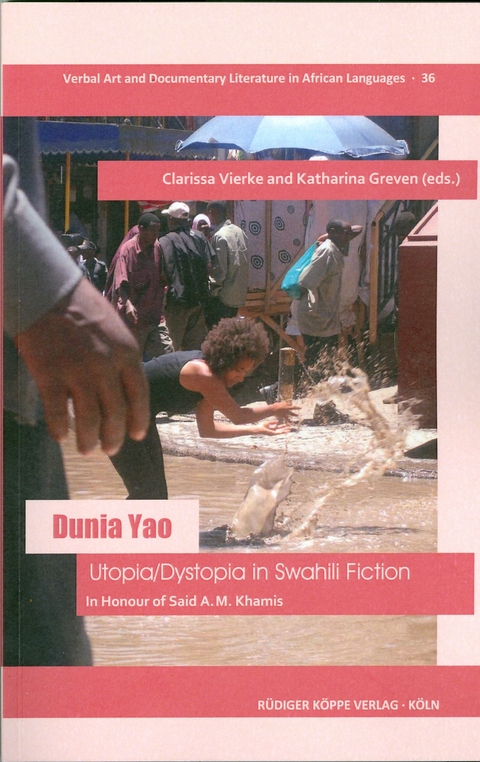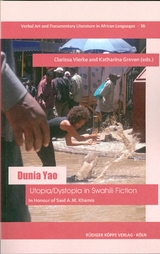Dunia Yao – Utopia/Dystopia in Swahili Fiction
In Honour of Said A.M. Khamis
Seiten
2016
Köppe, R (Verlag)
978-3-89645-736-3 (ISBN)
Köppe, R (Verlag)
978-3-89645-736-3 (ISBN)
- Titel leider nicht mehr lieferbar
- Artikel merken
Obwohl Afro-Futurismus ein wichtiges Diskussionsthema in der afrikanischen Kunst und Literatur darstellt, wurde die Literatur in afrikanischen Sprachen bislang kaum systematisch auf ihre Zukunftsvisionen bezogen untersucht. Schwerpunktmäßig auf Swahili-Literatur ausgerichtet, präsentiert der vorliegende Sammelband solche Beiträge, die einen seit den 1990er-Jahren in Ostafrika verbreitet auftretenden Literaturtrend aufgreifen: Eine Reihe sogenannter „experimental novels“ zeichnen dunkle Zukunftsbilder ihrer Gesellschaften und brechen gleichzeitig mit zahlreichen Konventionen des etablierten Romans. Häufig mithilfe einer vergleichenden Herangehensweise stellen die Beiträge eine facettenreiche und faszinierende Literaturgeschichte vor, die von den folgenden Fragestellungen abhängt: Wie gestalten/gestalteten Swahili-Autoren die Mittel für ihr literarisches Schaffen? In welchem Bezug steht der innovative Stil und die entfremdete fiktionale Welt der Werke zu den wiederkehrend bekräftigten sozialen Verpflichtungen des Romans?
INHALT:
Clarissa Vierke / Katharina Greven:
Dunia Yao – Critical Visions of the Future in Swahili Fiction
A ‘NEW’ TREND – PERSPECTIVES OF LITERARY HISTORY
Lutz Diegner:
Dunia Yake – An Appraisal of Said Ahmed Mohamed’s Novels
Mikhail D. Gromov:
‘Local Achievement’ or ‘External Influence’? Intertextuality and Political Satire in the ‘New’ Swahili Novel in Kenya
Clarissa Vierke:
The ‘Unhomely City’ – A Literary Figuration in Swahili Dystopian Literature
READINGS OF THE NOVEL BEYOND REALISM
Elena Bertoncini:
Postmodernism in Swahili Fiction and Drama
Alena Rettová:
From Mimesis to Mize – Philosophical Implications of Departure from Literary Realism
Peter Simatei:
Magical Realism and Utopian/Dystopian Impulses in Said Ahmed Mohamed’s "Babu Alipofufuka"
UTOPIA AS SOCIALLY COMMITTED NARRATIVE
Abdilatif Abdalla:
Fasihi ya Kiswahili na Mabadiliko ya Jamii za Afrika ya Mashariki – Nukta Chache
Geoffrey Kitula King’ei:
Taswira za Ukosoaji na ‘Utopia’ katika Ushairi wa Said Ahmed Mohamed
Magdaline N. Wafula:
Generational Conflicts in Dunia Yao – ‘Utopia versus Dystopia´
Ken Walibora Waliaula:
Unravelling the Riddle of ‘Their World’ and ‘Our World’ in Said A. Mohamed’s "Dunia Yao"
Notes on Contributors
REZENSION:
„Recent years have seen a renewed scholarly interest in utopian and/or dystopian literary writing more generally. [...] The volume co-edited by Clarissa Vierke and Katharina Greven addresses a trend in Swahili literature and, most specifically, Swahili novels since the 1990s, which are often referred to as “new” or “experimental novels” and many of which resonate with aspects of utopian and/or dystopian writing. Dunia Yao, the 2006 novel by Said Ahmed Mohamed evoked in the volume’s title, represents, as the editors say, an “important example of the trend”, being set in a constructed, distant future world and offering “views on nightmarsh sceneries of devastation and chaos”. [...] All in all, the volume represents an important and valuable contribution to a growing body of book-length critical studies of topics in Swahili literary discourse. By focusing on more recent developments in Swahili literary history, it provides a fascinating perspective on aspects of, as well as critical discourse on, the aesthetics and sociocritical concerns of contemporary Swahili literature. This makes it relevant not only to scholars of Swahili literature but of African literatures more generally. [...] the volume fills a major gap, drawing attention to the perhaps obvious, but sometimes underestimated fact that African-language literatures partake of and creatively interact with global discourses and paradigms in multiple ways. In this respect, it enhances future comparative research.“
(Anja Oed in „Africa Book Link“, Winter 2016/2017, 1-3)
INHALT:
Clarissa Vierke / Katharina Greven:
Dunia Yao – Critical Visions of the Future in Swahili Fiction
A ‘NEW’ TREND – PERSPECTIVES OF LITERARY HISTORY
Lutz Diegner:
Dunia Yake – An Appraisal of Said Ahmed Mohamed’s Novels
Mikhail D. Gromov:
‘Local Achievement’ or ‘External Influence’? Intertextuality and Political Satire in the ‘New’ Swahili Novel in Kenya
Clarissa Vierke:
The ‘Unhomely City’ – A Literary Figuration in Swahili Dystopian Literature
READINGS OF THE NOVEL BEYOND REALISM
Elena Bertoncini:
Postmodernism in Swahili Fiction and Drama
Alena Rettová:
From Mimesis to Mize – Philosophical Implications of Departure from Literary Realism
Peter Simatei:
Magical Realism and Utopian/Dystopian Impulses in Said Ahmed Mohamed’s "Babu Alipofufuka"
UTOPIA AS SOCIALLY COMMITTED NARRATIVE
Abdilatif Abdalla:
Fasihi ya Kiswahili na Mabadiliko ya Jamii za Afrika ya Mashariki – Nukta Chache
Geoffrey Kitula King’ei:
Taswira za Ukosoaji na ‘Utopia’ katika Ushairi wa Said Ahmed Mohamed
Magdaline N. Wafula:
Generational Conflicts in Dunia Yao – ‘Utopia versus Dystopia´
Ken Walibora Waliaula:
Unravelling the Riddle of ‘Their World’ and ‘Our World’ in Said A. Mohamed’s "Dunia Yao"
Notes on Contributors
REZENSION:
„Recent years have seen a renewed scholarly interest in utopian and/or dystopian literary writing more generally. [...] The volume co-edited by Clarissa Vierke and Katharina Greven addresses a trend in Swahili literature and, most specifically, Swahili novels since the 1990s, which are often referred to as “new” or “experimental novels” and many of which resonate with aspects of utopian and/or dystopian writing. Dunia Yao, the 2006 novel by Said Ahmed Mohamed evoked in the volume’s title, represents, as the editors say, an “important example of the trend”, being set in a constructed, distant future world and offering “views on nightmarsh sceneries of devastation and chaos”. [...] All in all, the volume represents an important and valuable contribution to a growing body of book-length critical studies of topics in Swahili literary discourse. By focusing on more recent developments in Swahili literary history, it provides a fascinating perspective on aspects of, as well as critical discourse on, the aesthetics and sociocritical concerns of contemporary Swahili literature. This makes it relevant not only to scholars of Swahili literature but of African literatures more generally. [...] the volume fills a major gap, drawing attention to the perhaps obvious, but sometimes underestimated fact that African-language literatures partake of and creatively interact with global discourses and paradigms in multiple ways. In this respect, it enhances future comparative research.“
(Anja Oed in „Africa Book Link“, Winter 2016/2017, 1-3)
| Erscheinungsdatum | 24.08.2016 |
|---|---|
| Reihe/Serie | Wortkunst und Dokumentartexte in afrikanischen Sprachen ; 36 |
| Co-Autor | Abdilatif Abdalla, Elena Bertoncini, Lutz Diegner, Mikhail Gromov, Geoffrey Kitula King’ei, Alena Rettová, Peter Simatei, Magdaline N. Wafula, Ken Walibora Waliaula |
| Einführung | Clarissa Vierke, Katharina Greven |
| Mitarbeit |
Herausgeber (Serie): Wilhelm J.G. Möhlig |
| Zusatzinfo | 2 Farbfotos, 1 Farbgrafik |
| Verlagsort | Köln |
| Sprache | englisch |
| Maße | 160 x 240 mm |
| Gewicht | 520 g |
| Einbandart | Paperback |
| Themenwelt | Literatur ► Lyrik / Dramatik ► Lyrik / Gedichte |
| Geisteswissenschaften ► Sprach- / Literaturwissenschaft ► Literaturwissenschaft | |
| Geisteswissenschaften ► Sprach- / Literaturwissenschaft ► Sprachwissenschaft | |
| Schlagworte | Dystopie • Festschrift • Ostafrika • Prosa • Roman • Said A.M. Khamis • Swahili-Literatur • Utopie • Zukunftsroman |
| ISBN-10 | 3-89645-736-5 / 3896457365 |
| ISBN-13 | 978-3-89645-736-3 / 9783896457363 |
| Zustand | Neuware |
| Haben Sie eine Frage zum Produkt? |
Mehr entdecken
aus dem Bereich
aus dem Bereich
Deutsche Gedichte aus zwölf Jahrhunderten
Buch | Hardcover (2023)
C.H.Beck (Verlag)
CHF 41,90




